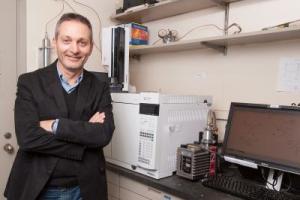Apr 1 2014
A University of Illinois at Chicago chemistry professor will lead the U.S. effort in a three-nation project to develop efficient catalytic methods that replace rare metals with abundant and inexpensive metals such as iron and copper.
 This is a photo of Vladimir Gevorgyan, University of Illinois at Chicago professor of chemistry. Credit: Joshua Clark/University of Illinois at Chicago Photo Services
This is a photo of Vladimir Gevorgyan, University of Illinois at Chicago professor of chemistry. Credit: Joshua Clark/University of Illinois at Chicago Photo Services
The project comes out of a competition sponsored by the International Union of Pure and Applied Chemists (IUPAC) to "foster networking between excellent scientists on topics in chemistry exemplified by a three-year pilot program in sustainable chemistry."
"This was a highly competitive process," said Vladimir Gevorgyan, College of Liberal Arts and Sciences Distinguished Professor at UIC. Only seven grants were awarded worldwide. The grants will be funded by government agencies within each country.
"The idea for our project came out of a collaboration between our lab and labs in Germany and China," Gevorgyan said.
"Often, catalysis uses very expensive and very rare metals," Gevorgyan said. "Some of these rare metals will be gone in 50 years. It's very important to move to catalytic materials that are abundant and cheap."
Sustainable chemistry is really 21st century science, Gevorgyan said.
"The idea of sustainable chemistry is very important. We're polluting too much, using up resources."
Gevorgyan's lab, which will be funded through the National Science Foundation, will focus on the use of copper complexes. The lab in Germany will focus on using iron. The Chinese will develop heterogeneous versions of these catalysts.
The scientists hope that the novel catalytic methods will allow for "a straightforward and environmentally benign synthetic chemistry" with applications in medicinal chemistry and material science.